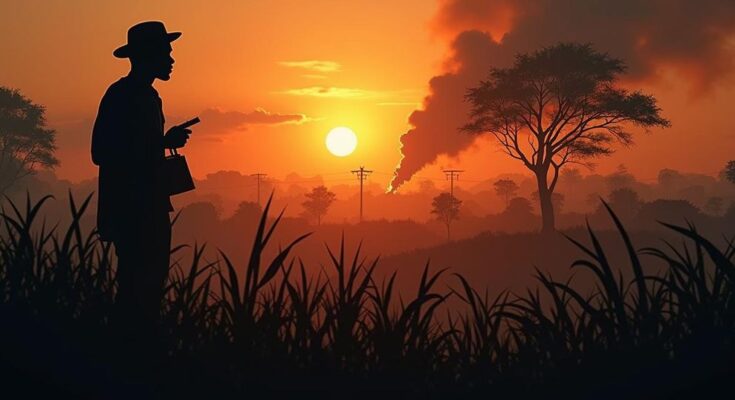The U.N. Human Rights Council has raised alarms over the worsening human rights conditions in the Democratic Republic of Congo, citing escalating violence, attacks on civilians, particularly women and children, and the prevalence of sexual violence. U.N. officials urge global attention to the humanitarian crises and call for influential nations to cease support for armed groups. The DRC government contends that external forces are undermining its efforts to maintain peace and protect human rights.
Human rights experts have issued a grave warning regarding the deteriorating human rights situation in the Democratic Republic of Congo (DRC), which has been fraught with challenges for decades. Armed conflicts, assaults on educational and medical institutions, sexual violence, and a range of other abuses are on the rise. During a session at the U.N. Human Rights Council in Geneva, U.N. High Commissioner for Human Rights Volker Türk emphasized the need for the global community to address the plight of Congolese civilians who are suffering from a volatile combination of escalating violence, regional and international influences, exploitative corporate practices, and a fragile legal system. He remarked that the number of individuals affected by human rights abuses is increasing, primarily due to armed groups engaged in combat in the eastern provinces, which have perpetrated deadly assaults on civilians and essential infrastructure, such as schools and hospitals. Moreover, sexual violence has reportedly spread despite ongoing efforts to mitigate and address these incidents. “The armed groups take people prisoners, subject women and girls to sexual slavery. Many of them have been killed after being raped. These cases, of course, have not all been reported. This is atrocious,” said Türk. He also noted that violations perpetrated by security forces during military operations against armed groups raise significant concerns, with incitements to hatred and discrimination intensifying political tensions across the nation. Türk called upon influential countries to leverage their power to cease hostilities, specifically addressing the need to halt any support provided by Rwanda to the M23 group in North Kivu and urged an end to any external backing for armed factions operating within the DRC. In response, DRC Minister of Human Rights Chantal Shambu Mwavita asserted that her government has made substantial advancements in safeguarding human rights despite the adversities stemming from the ongoing conflict in the eastern regions. She pointed to external “negative forces” that are reportedly supporting the armed groups and urged the international community to denounce these actions while placing targeted sanctions on Rwanda for its destabilizing influence. Mwavita linked the eastern war to the illegal plunder of natural resources facilitated by both Rwanda and other nations, and she demanded the immediate and unconditional withdrawal of Rwandan military presence from Congolese territory. The eastern provinces of North Kivu and its neighboring territories have long been plagued by violence, with armed groups vying for control over the region’s lucrative resources. Rwanda has refuted claims of backing the M23 rebels, with Foreign Minister Olivier Nduhungirehe accusing the Congolese government of evading an agreed-upon resolution to the ongoing M23 conflict. Additionally, Rwanda’s ambassador to the U.N. in Geneva, James Ngango, expressed concern regarding the rise in human rights violations, particularly related to sexual abuse and attacks on children in areas affected by armed conflict. He emphasized Rwanda’s commitment to peaceful dialogue and the regional peace processes, affirming, “No military solution can address the root causes of the conflict in eastern DRC.” The future regarding the DRC’s demands for the withdrawal of Rwandan forces remains uncertain, as does the timeline for the withdrawal of MONUSCO, the U.N.’s peacekeeping contingent, which has been requested by Felix Tshisekedi’s government. Although the U.N. had intended for peacekeepers to depart by year’s end, they appear to have received an extension, with several thousand troops still stationed in North and South Kivu, as well as Ituri provinces. Bintou Keita, the special representative of the secretary-general in the DRC and MONUSCO’s head, painted a stark picture of the human rights landscape, citing the deteriorating security situation leading to civilian casualties and mass displacements of people towards major urban centers. The M23 has engaged in territorial expansion, with recent territorial triumphs following intense confrontations. Disturbingly, they have intentionally targeted hospitals and sites for internally displaced persons, amplifying the ongoing humanitarian crisis. Keita reiterated MONUSCO’s commitment to continue aiding the DRC within the framework of the U.N. human rights policy while asserting that peace in the DRC will necessitate both military and non-military cooperative efforts to uncover enduring solutions at both national and regional levels. The conflict in the DRC has exacted a considerable toll, as the region endures dual humanitarian crises — the internal displacement crisis alongside a severe food crisis, affecting millions; it is reported that 7.2 million individuals are currently displaced internally, with nearly 26 million facing acute food insecurity.
The Democratic Republic of Congo has been grappling with persistent human rights violations for several decades, largely due to ongoing armed conflicts and the activities of various armed groups vying for control over the region’s valuable resources. The eastern provinces, particularly North Kivu, have witnessed escalating violence, leading to increased civilian casualties and a humanitarian crisis marked by widespread displacement and severe food insecurity. Despite international oversight and involvement, human rights abuses continue to plague the nation, exacerbated by political tensions and regional intervention.
The situation in the Democratic Republic of Congo poses critical human rights challenges as armed conflicts intensify and civilian suffering escalates. The U.N. High Commissioner for Human Rights has called for urgent international intervention to address the plight of Congolese civilians. The government of the DRC has acknowledged progress in safeguarding rights while attributing the ongoing conflicts to external influences, primarily from Rwanda. The complexities of the conflict underscore the dire need for a comprehensive and collaborative approach to foster lasting peace and stability in the region, and to address the humanitarian crises that continue to afflict millions of citizens.
Original Source: www.voanews.com




